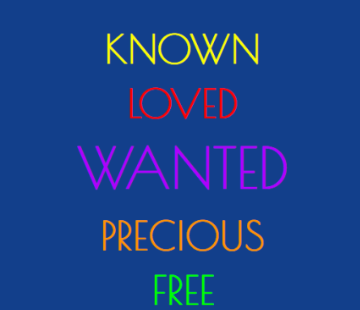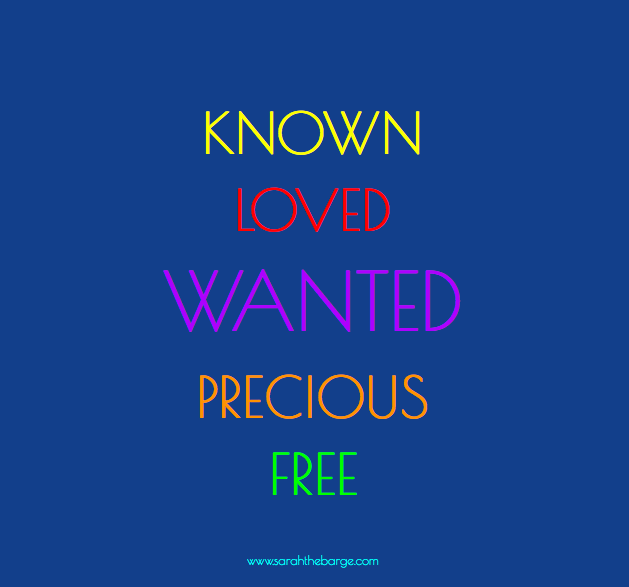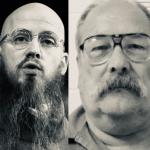
You know how some days you wake up in the morning, and you have no idea that by the time the day is over, your life will have been profoundly changed? That happened to me in June last year, when I was on a one-week trip to Israel.
Our Israeli tour guide took us to the banks of the Jordan River, where Jesus was baptized. At the river, there’s a long tiled wall where the verse Mark 1:11 is translated into at least a hundred languages.
The NIV translates the verse, “You are my Son, whom I love; with you I am well pleased.”
But our guide took us to the Hebrew translation, which translates, “You are my child. My soul wanted you.”
For a minute, time stood still and I just stood there, blinking, wondering if I’d heard the guide correctly.
I touched his elbow. “What does it say again?” I whispered.
“You are my child. My soul wanted to you.”
Of all the things a father could say to a son, of all the things God could say to his child, I can’t imagine anything more beautiful, more overwhelming, more generous or more transformative than those words.

My Soul Wanted You.
Sometimes it’s hard for us to feel wanted.
We were made for connection and belonging and yet, because we live in a broken world that’s not yet been fully restored, we feel the distance between what is and what should be.
We were made for love and romance and intimacy, and yet whether we’re single or in an imperfect marriage, we feel the ache of not being known.
We were made to belong to other people and yet we often feel the sting of rejection. There’s no seat for us at the lunch table. We don’t make tryouts for the basketball team or the play. We fail to make the deans list. We don’t get the dream job we interviewed for.
Even inside the church, we face rejection. Single people are excluded from marriage classes. Childless women are excluded from the moms’ group. Broken people often feel excluded from the congregation of shiny people with solid marriages, two well-behaved kids, a middle-to-upper class income and a place to go for holidays.
We were made for intimate belonging — and yet even in small ways, from the time we’re young, we begin to lose the belonging we crave. As children, we lose our favorite stuffed animal in the chaos of the airport. Our best childhood friend moves three states away — or, worse, chooses a new best friend.
Throughout life we lose siblings and parents and friends to addiction and depression and misunderstandings and death.
And in this brokenness, in the feeling of rejection and unbelonging, we begin to learn a twisted way of being. A way of trying to insure our security while at the same time isolating ourselves from the possibility of risk and grief.
We come to rest our identity in things that give us dopamine surges, things that are more tangible than God, things that give us a stronger sense of control.
We come to believe that our belonging is mutually exclusive with another’s. That in order for us to belong more, other people have to belong less. And we begin to practice on others the same criticism, judgment, stiff-arming and rejection that we hate experiencing ourselves. We become the “in” crowd, the “it” group, the Mean Girls, the gate keepers who decide who gets let in and who gets turned back at the door.
As C.S. Lewis points out, true intimacy and guaranteed self-protection are mutually exclusive.
To love at all is to be vulnerable. Love anything and your heart will be wrung and possibly broken. If you want to make sure of keeping it intact you must give it to no one, not even an animal. Wrap it carefully round with hobbies and little luxuries; avoid all entanglements. Lock it up safe in the casket or coffin of your selfishness. But in that casket, safe, dark, motionless, airless, it will change. It will not be broken; it will become unbreakable, impenetrable, irredeemable. To love is to be vulnerable. (from The Four Loves)
I think we already know this on some level — that we can’t be selfish and intimate at the same time. But we try anyway.
What finally breaks down barriers, brings us peace, makes us feel like we finally belong — and makes us people who practice belonging instead of rejection towards others — is there in Mark 1. There on the wall at the Jordan River. There at the place of transformation. There at the place of deep acceptance — and empowerment to demonstrate that same acceptance to the world.
It’s standing in the river, seeing the clouds part, feeling God’s presence descending like a dove. It’s Divine Love washing off your confusion, failings, flaws, hurts and shames with the simple, transformative, soul-healing words: “You are my child. My soul wanted you.”















